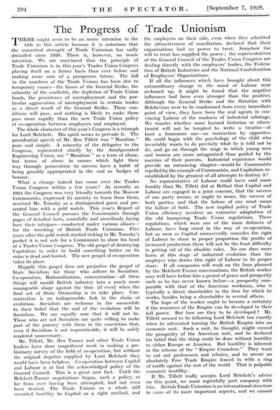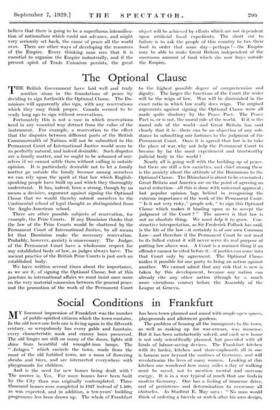The Progress of Trade Unionism
THERE might seem to be an ironic intention in the title to this article because it is notorious that the numerical strength of Trade Unionism has sadly dwindled since 1926. There is, however, no ironic intention. We are convinced that the principle of Trade Unionism is in this year's Trades Union Congress placing itself on a firmer basis than ever before and making more sure of a prosperous future. The fall in the numbers of the Trade Unions has been due to temporary causes—the fiasco of the General Strike, the calamity of the coalfields, the depletion of Trade Union funds, the persistence of unemployment and the par- ticular aggravation of unemployment in certain trades as a direct result of the General Strike. These con- ditions will pass, and nothing is likely to make them pass more rapidly than the new Trade Union policy of co-operation between employers and employed.
The whole character of this year's Congress is a triumph for Lord Melchett. His spirit seems to pervade it. The presidential speech of Mr. Ben Tillett was " Mondism " pure and simple. A minority of the delegates to the Congress, represented chiefly by the Amalgamated Engineering Union, use " Mondism " as a term of abuse, but terms of abuse in causes which fight their way through persecution to success have a habit of being greedily appropriated in the end as badges of honour.
What a change indeed has come over the Trades Union Congress within a few years ! As recently as 1924 the Congress was very friendly towards the Moscow Communists, expressed its anxiety to learn from them, received Mr. Tomsky as a distinguished guest and pre- sented him with a gold watch. This year's Report of the General Council pursues the Communists through pages of detailed facts, scornfully and mercilessly laying bare their intrigues—conducted under various aliases— for the wrecking of British Trade Unionism. Five years after the gold watch started ticking in Mr. Tomsky's pocket it is not safe for a Communist to show his head at a Trades Union Congress. The old gospel of destroying Capitalism in order to build something better on its ruins is dead and buried. The new gospel of co-operation takes its place.
Happily this gospel does not prejudice the gospel of State Socialism for those who adhere to Socialism. Co-operation, Rationalization, concentration—all these things will mould British industry into a much more manageable shape against the time (if ever) when the final act of State Ownership is to take place. Con- centration is an indispensable link in the chain of evolution. Socialists are welcome in the meanwhile to their belief that the end of the evolution will be Socialism. We are equally sure that it will not be. Those who are not Socialists are quite willing to make part of the journey with them in the conviction that, even if Socialism is not impracticable, it will be safely rendered unnecessary.
Mr. Tillett, Mr. Ben Turner and other Trade Union leaders have done magnificent work in making a pre- liminary survey of the field of co-operation, but without the original impetus supplied by Lord Melchett they would have been helpless. - Co-operation between Capital and Labour is at last the acknowledged policy of the General Council. This is a great new fact. Until the Melchett-Turner negotiations began, such a policy, so far from ever having been attempted, had not even been desired. The Trade Unions as a whole still regarded hostility to Capital as a right method, and the employers on their side, even when they admitted the attractiveness of conciliation, declared that their organizations had no power to treat. Sorrf how the will to treat has supplied the power ; the representatives of the General Council of the Trades Union Congress are dealing directly with the employers' bodies, the Federa- tion of British Industries and the National Confederation of Employers' Organizations.
If all the influences which have brought about this extraordinary change in the mind of Labour were reckoned up, it might be found that the negative influences had been even stronger than the positive. Although the General Strike and the flirtation with Bolshevism were to be condemned from every immediate point of view, they have been the real agents in con- vincing Labour of the madness of industrial sabotage. We wonder whether some learned historian or educa- tionist will not be tempted to write a treatise—at least a humorous one—on instruction by opposites. He could begin with the psychology of the child who invariably wants to do precisely what he is told not to do, and go on through the stage in which young men and women are more antagonized than guided by the maxims of their parents. Industrial experience would provide an entrancing chapter—would-be Communists repelled by the example of Communists, and Capitalism re- established by the greatest of all attempts to destroy it !
No representative of Labour could have said more frankly than Mr. Tillett did at Belfast that Capital and Labour are engaged in a joint concern, that the success of one party means, or ought to mean, the success of both parties, and that the failure of one must mean the failure of both. The new implied policy of Trade Union efficiency involves an extensive adaptation of the old hampering Trade Union regulations. These regulations, which were one of the main defences of Labour, have long stood in the way of co-operation, but as soon as Capital unreservedly concedes the right of Labour to share in proper proportion the profits of increase& production there will not be the least difficulty in getting rid of the obsolete rules. No one does more harm at this stage of industrial evolution than the employer who denies this right of Labour to its proper share. If all companies will work on the lines planned by the Melchett-Turner conversations, the British worker may well have before him a period of peace and prosperity such as he has never known before—a prosperity com- parable with that of the American workman, who is typically a direct shareholder in the firm for which he works, besides being a shareholder in several others.
The hope of the worker ought to become a certainty if the resources of the Empire can be developed to their full power. But how are they to be developed ? Mr. Tillett seemed to be following Lord Melchett too exactly when he advocated turning the British Empire into an economic unit. Such a unit, he thought, might exceed the prosperity of the American unit, and he declared his belief that the thing could be done without hostility to either Europe or America. But hostility is inherent in the scheme of the " Empire Crusaders." They want to cut out preferences and rebates, and to secure an absolutely Free Trade Empire fenced in with a ring of tariffs against the rest of the world. That is palpable economic hostility.
If Mr. Tillett really accepts Lord Melchett's advice on this point, we must regretfully part company with him. British Trade Unionism is an international structure in some of its more important aspects, and we cannot believe that there is going to be a superfluous intensifica- tion of nationalism which could not advance, and might very seriously set back, the cause of peace all the world over. There are other ways of developing the resources of the Empire. Every thinking man sees that it is essential to organize the Empire industrially, and if the present spirit of Trade Unionism persists, the great object will be achieved by efforts which are not dependent upon artificial fiscal expedients. The short cut to failure is to ask the people of this country to tax their food in order that some day—perhaps !—the Empire may be able to make Great Britain independent of the enormous amount of food which she now buys outside the Empire.

































 Previous page
Previous page